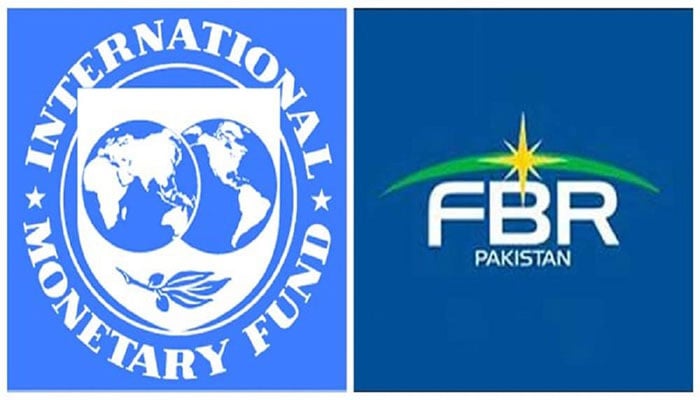Pakistan, IMF agree to lower FBR’s tax collection target
The two sides agreed for revival of the programme, but it required stamped approval of the Fund’s executive board, which is expected to be held by the end of the ongoing month.
ISLAMABAD: Pakistan and the International Monetary Fund (IMF) have agreed to revise downward the annual tax collection target of the Federal Board of Revenue (FBR) in order to revive the stalled extended fund facility (EFF) programme.
The tax collection target would be lowered by Rs246 billion, from Rs4,963 billion to Rs4,717 billion, for the current fiscal year, 2020-21. The two sides agreed for revival of the programme, but it required stamped approval of the Fund’s executive board, which is expected to be held by the end of the ongoing month.
The IMF and Pakistan also agreed to fix the next budget’s FBR target at Rs6,000 billion, a gigantic task, in which the government would be given the task to collect additional Rs1,300 billion with the help of normal growth plus different stringent taxation measures. The FBR has so far collected Rs2,916 billion during the first eight months (July-Feb) period of the current fiscal year, and the Board would have to collect Rs1,801 billion during the next four months (March-June) period to materialise its downward the revised target of Rs4,717 billion on its board on June 30, 2021.
On an average, the FBR would have to collect over Rs450 billion every month in the next four months for achieving the desired target. Independent economists argued that the FBR could collect Rs4,300 to Rs4,400 billion during the current fiscal year and with adoption of stringent measures through taking advances, it could go up to Rs4,500 billion. But achieving the revised downward target of Rs4,717 billion seems a bit difficult, they added.
Now the FBR official circles say that the Board would be able to achieve its desired tax collection target for the current fiscal year. The FBR was taking all required measures and database would be utilised to bring potential income earners into tax net.
When contacted, FBR Member Inland Revenue (Operations) Dr Mohammad Ashfaque Ahmed said on Friday that the tax machinery took different measures without creating hue and cry for the purpose of streamlining the tax collection. He said that the tax machinery generated tax demand of Rs1.4 trillion, highest in the last six years, which would be materialised into taxability after completing all procedures. He said the FBR showed zero tolerance for corruption and wrongdoings and took a number of other steps that would be converted into taxability with certain time lag. He said the FBR streamlined its collection despite COVID-19 pandemic difficulties.
-
 World Economic Forum CEO Borge Brende Steps Down Following Jeffrey Epstein Ties Controversy
World Economic Forum CEO Borge Brende Steps Down Following Jeffrey Epstein Ties Controversy -
 Prince Harry's Ex Chelsy Davy Makes Special Announcement
Prince Harry's Ex Chelsy Davy Makes Special Announcement -
 Dominic Evans Speaks Out After Being Accused Of Being Involved In Nancy Guthrie Kidnapping
Dominic Evans Speaks Out After Being Accused Of Being Involved In Nancy Guthrie Kidnapping -
 AI Doomsday By 2028? New Study Warns Of Global Social, Economic Disruption & ‘ Intelligence Crisis’
AI Doomsday By 2028? New Study Warns Of Global Social, Economic Disruption & ‘ Intelligence Crisis’ -
 Do Sophie And Benedict Bridgerton Get Married As Netflix Show Returns For Season 4 Part 2?
Do Sophie And Benedict Bridgerton Get Married As Netflix Show Returns For Season 4 Part 2? -
 Prince William Reveals He's 'a Little Biased' Toward One Hollywood Star
Prince William Reveals He's 'a Little Biased' Toward One Hollywood Star -
 Meghan Markle, Prince Harry Visit Special Charity On Final Day Of Jordan Trip
Meghan Markle, Prince Harry Visit Special Charity On Final Day Of Jordan Trip -
 Natalie Dormer's Reaction To Sarah Ferguson's Epstein Links Resurfaces After 'The Lady' Release
Natalie Dormer's Reaction To Sarah Ferguson's Epstein Links Resurfaces After 'The Lady' Release -
 Did You Know Famous Windows 10 Background Was Shot In Real Life? Here's Story
Did You Know Famous Windows 10 Background Was Shot In Real Life? Here's Story -
 Pete Davidson's Baby Mommy Elsie Hewitt Reveals Why She 'hated' Being Pregnant
Pete Davidson's Baby Mommy Elsie Hewitt Reveals Why She 'hated' Being Pregnant -
 Harry, Meghan Show Royal Family How To Make Impact Without Public Money
Harry, Meghan Show Royal Family How To Make Impact Without Public Money -
 Hillary Clinton Set For Deposition Before House Committee Today In Jeffrey Epstein Investigation Case
Hillary Clinton Set For Deposition Before House Committee Today In Jeffrey Epstein Investigation Case -
 Samsung Galaxy S26 Ultra Debutes With Display That Blocks Side Viewers
Samsung Galaxy S26 Ultra Debutes With Display That Blocks Side Viewers -
 Fans In Shock As 'Smiling Friends' Creators End Cult-favourite Sitcom On Adult Swim: 'They Did It On Purpose'
Fans In Shock As 'Smiling Friends' Creators End Cult-favourite Sitcom On Adult Swim: 'They Did It On Purpose' -
 Meghan Markle Accused Of Mimicking Kate’s Iconic Style On 'pseudo Royal Tour'
Meghan Markle Accused Of Mimicking Kate’s Iconic Style On 'pseudo Royal Tour' -
 Social Media Addiction ‘like Smoking’: Mumsnet Calls For Under-16s Ban With Cigarette-style Warnings
Social Media Addiction ‘like Smoking’: Mumsnet Calls For Under-16s Ban With Cigarette-style Warnings




